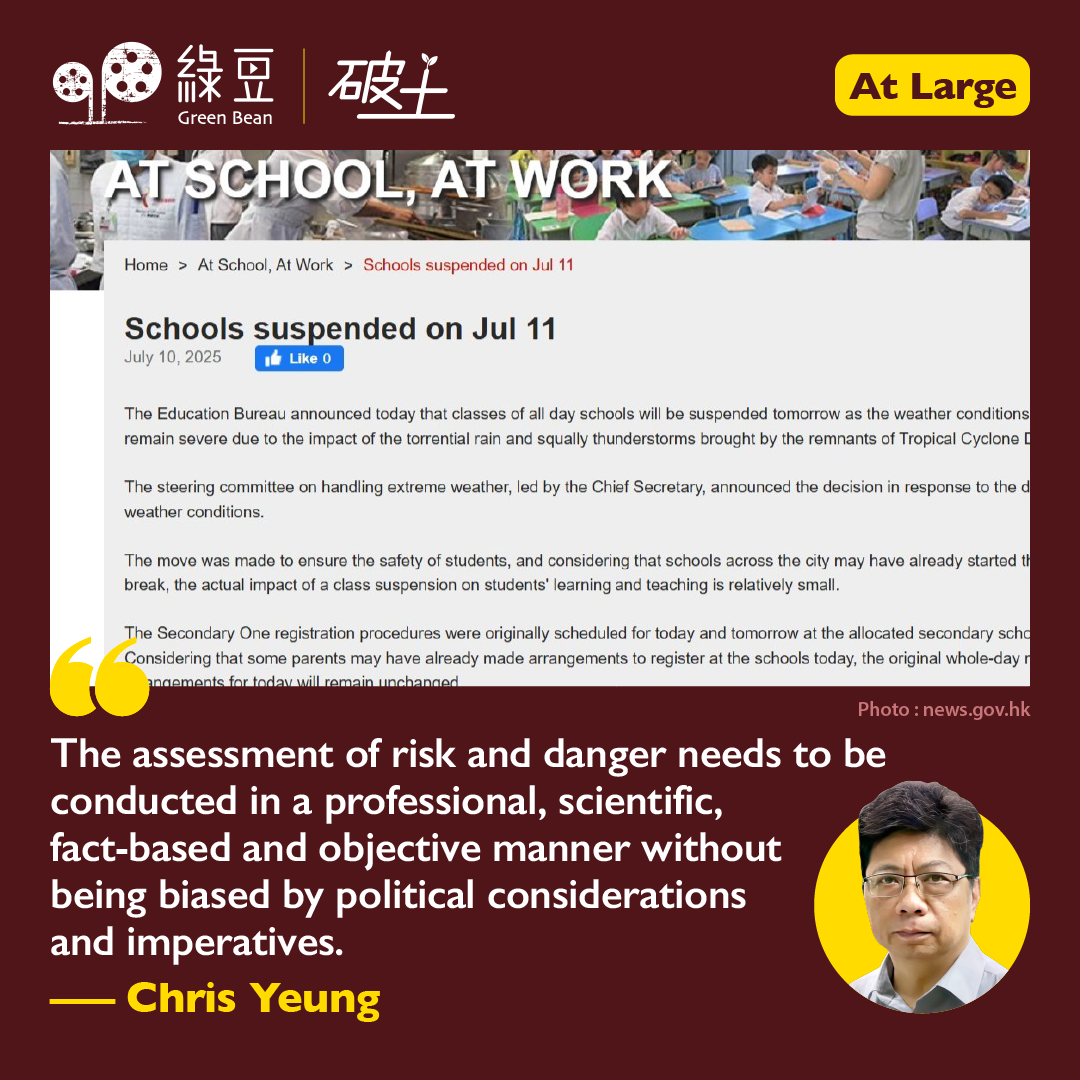Typhoon remnants hit John Lee team

Tropical cyclone Danas on last Tuesday (8/7) landed in eastern Zhejiang province in China. Hong Kong, roughly 582 miles from it, was unaffected. Three days later, the city’s government was hit by a storm of criticism over its “preemptive” decision to cancel all school classes as Danas refused to go away.
Preemptive preparation
The John Lee administration switched to crisis mode as remnants of Danas moved westwards in the Guangdong region, causing heavy downpours and thunderstorms across the city on Wednesday.
Fears of the potential damages caused by adverse weather that might devastate the city have prompted the team to convene a crisis meeting on Wednesday.
A decision to cancel all day school classes on Friday was taken at the cross-departmental meeting chaired by Chief Secretary Eric Chan, the Hong Kong SAR’s Number Two official, on Wednesday.
Coined by officials as a “preemptive preparation”, the government announced the decision in early Thursday afternoon, almost 18 hours earlier than the usual time of announcement of cancellation of school classes due to typhoons or adverse weather.
Social media began to be flooded with criticism and bashing by angry parents on Friday morning when the weather turned out to be calm with no heavy downpours, but occasional sunshine.
At noon, Chan took another preemptive initiative, this time to avert a public relations crisis, as he published a lengthy post on social media, saying it was better to be “safe than sorry”.
He detailed observations of local forecasters predicting that Hong Kong could have faced its fifth-largest daily rainfall, or 390 mm, in an “extreme” case. Chan said he was “very worried” . And he added that he did not want parents and children suffering from chaos, difficulty and embarrassment travelling to schools during adverse weather as happened in the past.
He explained the committee that he chaired faced a “difficult decision” on whether to make regular forecasts and anti-disaster preparations as normal or to take “preemptive” actions based on “macro forecasts” to give better safety protection to the people.
Then came the decision to announce cancellation of all day schools on Friday.
Take a bet
In his post, Chan has admitted he was told by experts “the earlier the forecasts are made the chance of error is definitely bigger.”
That he still decided not to stick to the well-established and generally-understood procedures in times of adverse weather but to take a bet has raised questions about the mind-set of the top echelon of the Lee team.
Intriguingly, major pro-Beijing newspapers took a preemptive stance on the government’s “preemptive cancellation” of day schools in their Friday editions. They heaped praises on the government, saying it is an effective move to ensure safety of people and gives a “feeling of safety and happiness” to the people. Those dailies kept silent on Saturday.
What appears to be a move aimed to win the hearts and minds of people by showing the government’s foresightedness and proactive approach in coping with adverse weather has brought huge embarrassment to Chan – and the Lee team.
Turn out to be the opposite
Like many governments in different parts of the world, the Hong Kong government was not immune to criticism of its deficiencies, if not failures, in coping with adverse weather and the damages that they have caused.
Chan was at the brunt of scathing criticism two years ago when people had to rush to go to work and students to schools amid heavy downpours in the aftermath of a severe typhoon. After that, Chan convened the cross-departmental committee on adverse weather.
Obsessed with the paramount importance of security and safety, the Lee team is anxious to avoid similar mistakes that may ignite public discontent towards the authorities.
The authorities dare not take any risk of public discontent over government policies or moves piling up and morphing into a governance crisis. This is despite the marked vanishing of mass protests and rallies in recent years.
Putting safety and security first and forecast is not fundamentally flawed. But the assessment of risk and danger needs to be conducted in a professional, scientific, fact-based and objective manner without being biased by political considerations and imperatives.
Failure to do so increases the risk of government “preemptive” moves, which are aimed to ensure people feel more happy and safer, turning out to be the opposite.
▌ [At Large] About the Author
Chris Yeung is a veteran journalist, a founder and chief writer of the now-disbanded CitizenNews; he now runs a daily news commentary channel on Youtube. He had formerly worked with the South China Morning Post and the Hong Kong Economic Journal.





